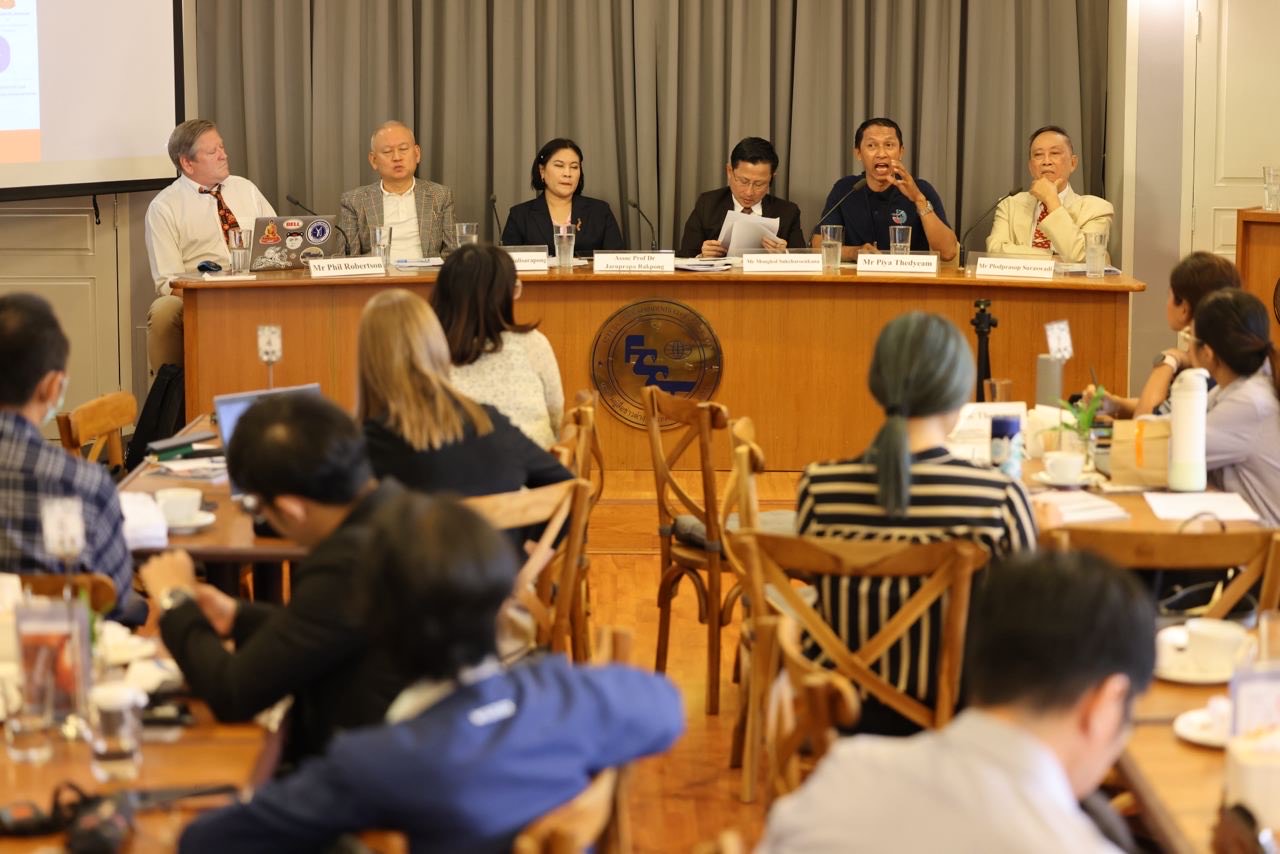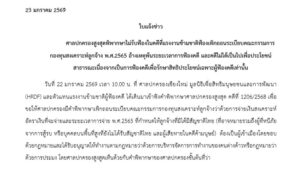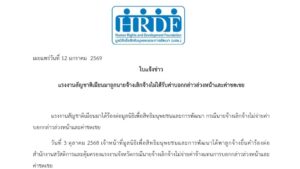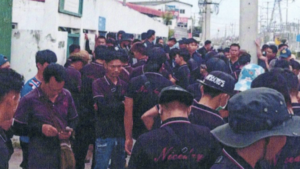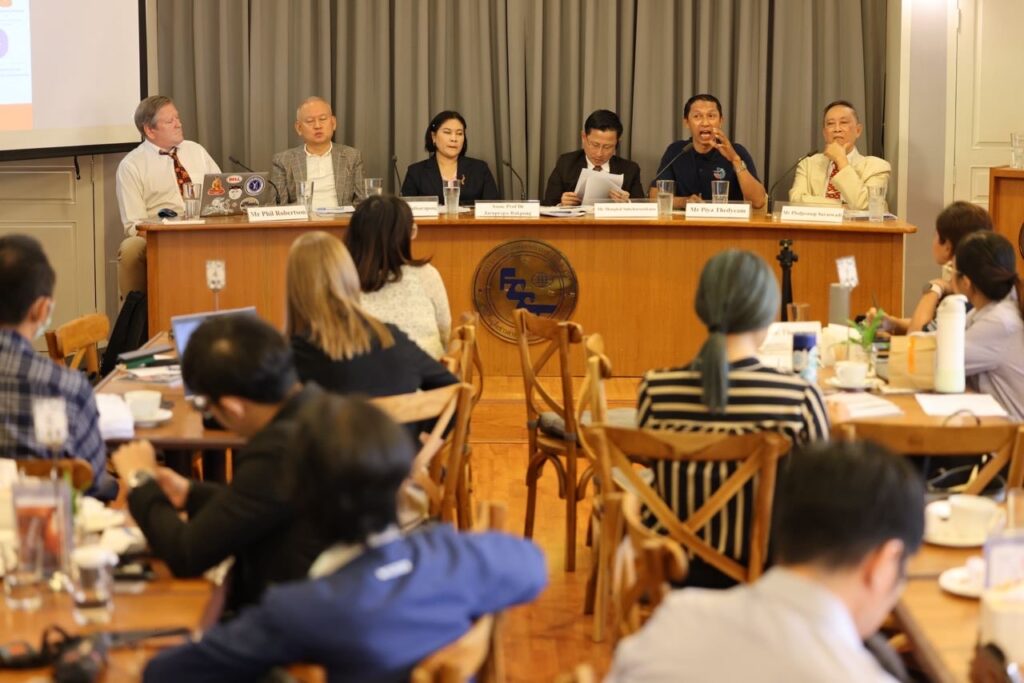
18 January 2024, 10.00-12.30, at the Foreign Correspondents’ Club of Thailand (FCCT), a civil society network composed of the Human Rights and Development Foundation (HRDF), the Environmental Justice Foundation (EJF), the Migrant Working Group (MWG) and the Solidarity Center (SC), held a press conference and a public discussion on “The Future of Thailand’s Fisheries: Exploring Global Trade Dynamics with a Focus on Labor Rights, Environmental Impact, and Seafood Market Standard” to propose recommended reform of the law and cooperation among concerned sectors and to monitor the state of laws and policies concerning the protection of fishing workers and the Free Trade Area agreement (FTA) related to Thailand attended by people’s organization networks, business sector and interested public.
EJF+ Human Rights Watchalarmed by Srettha government’s reform of fishery law to stifle human rights, paving the way for human trafficking, affecting export sector worth 172 billion baht
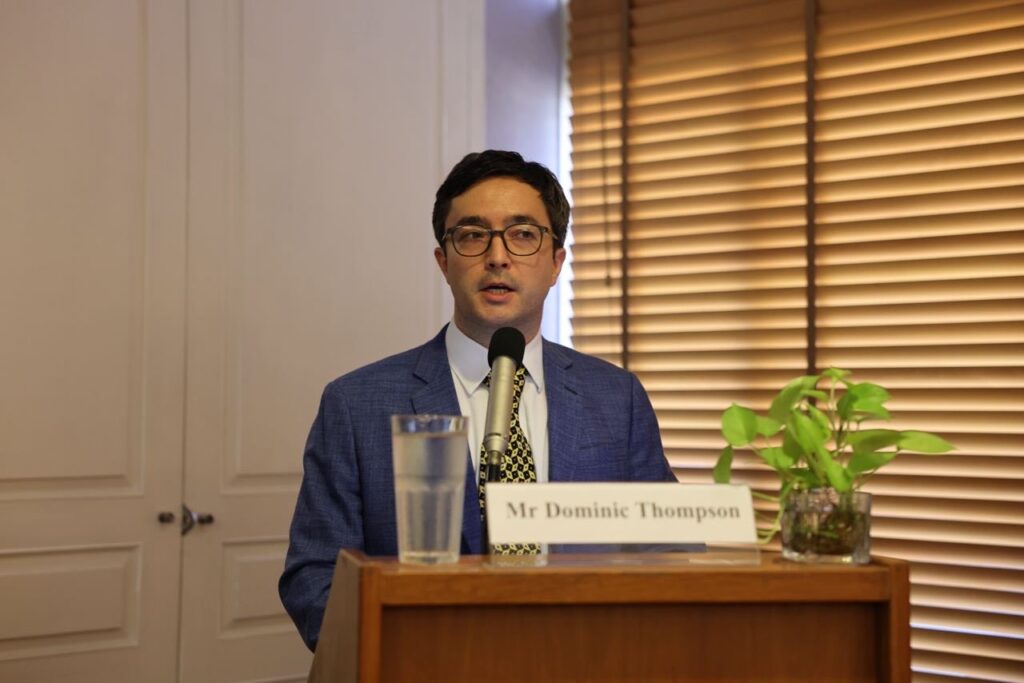
Dominic Thomson and Project Manager for Southeast Asia, Environmental Justice Foundation (EJF), describes changes in the administration of Thailand’s fishery under the Srettha Thavisin government during the global trade forum in which civil society shares their concern and proposes recommendations. In the past several years, Thailand has caused controversies at the international level concerning human rights violation, the use of forced labour and child labor. Meanwhile, reform in the fishery industry has made Thailand a pioneering leader in the region in terms of the sustainable, legal and fairer fishery and seafood export. Nonetheless, a backsliding trend regarding the administration of fishery industry could be observed and this may deal a big blow to human rights and Thailand’s reputation at the international level. It may thwart the attempt of the new administration to attract news foreign investments. Thomson further said that the relaxation of legal application could spell a trouble the existing fishery and seafood export measures. The export volume of seafood in 2021 reached 172 billion baht. But as far as Thailand’s international obligations regarding seafood traceability is concerned, this may prompt a number of buying countries to reconsider their purchase of seafood from Thailand. Responses to this problem must be made clear and transparent and instead of relaxing the legal application, it should be enhanced to ensure the sustainability of Thailand’s seafood industry and to ensure a safe working environment for workers as well as to ensure the sustainability of Thailand’s economy to pass on from generation to generation.
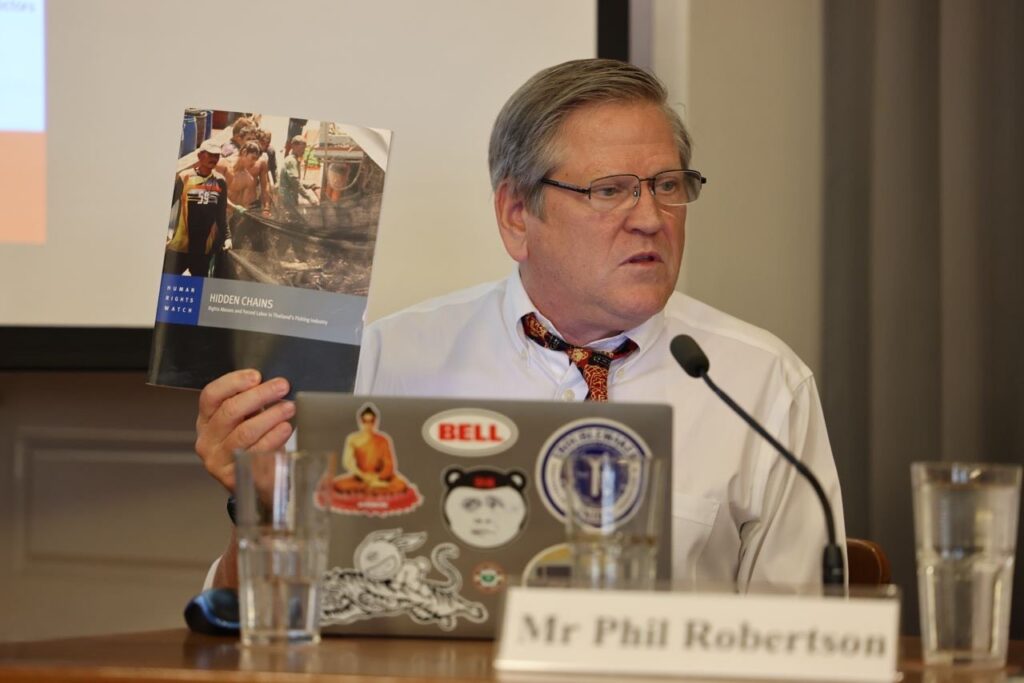
Phil Robertson, Deputy Director of Human Rights Watch’s Asia Division said that the Thai government’s proposed reform of fishery regulations will deal a blow to the fishing workers, particularly any change made to the vessel tracking regime to allow the fishing vessel to set sail for more than 30 days at a time and the permission for the transshipment of fishing workers. This will pave the way for the emergence of human trafficking and most importantly the IUU fishing.
Artisanal fishery reiterating any legal change must ensure equal access to resources -human dignity – sustainability for next generation
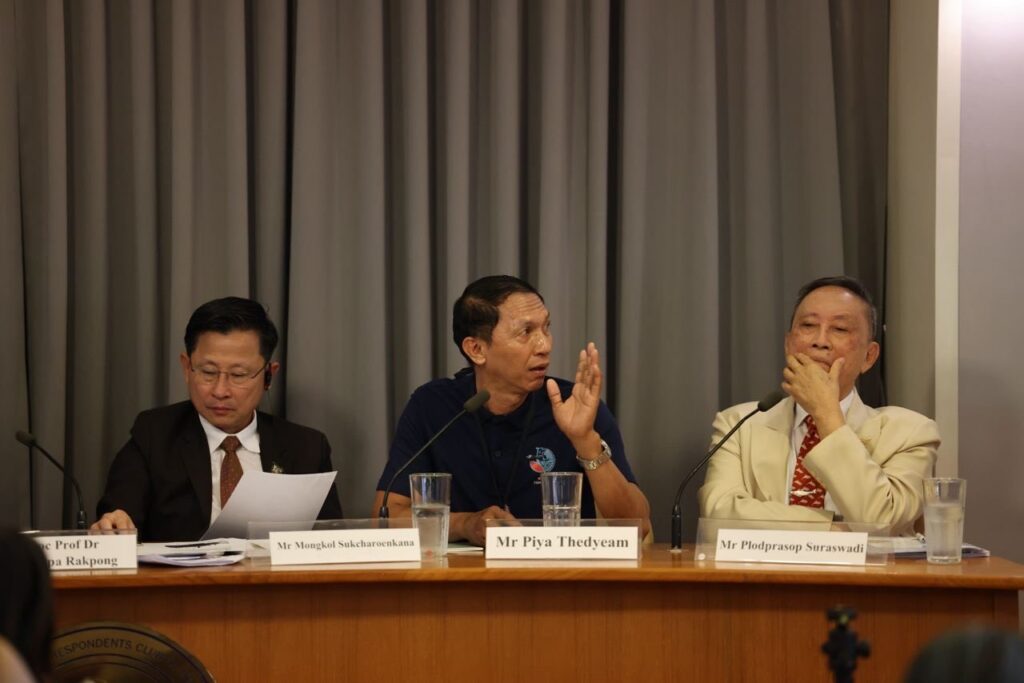
Piya Thetyam, Chairperson of the Federation of Thai Fisherfolk Association, said that artisanal fishery has until now not been recognized and its importance has been alarmingly decimated. I do not say this just from my emotion or feeling. Rather, this is a conclusion reached by the participants during the assembly of 66 artisanal fishery networks under the helm of the Federation of Thai Fisherfolk Association. In all forums to discuss the drafting of the Draft Act for the amendment of the Royal Ordinance on Fisheries B.E. 2558 by representatives of six political parties including the draft prepared by the Pheu Thai Party, when compared with the Royal Ordinance on Fisheries B.E. 2558 and its amendments in 2017, the Royal Ordinance on Fisheries B.E. 2558’s Section 4 (2) places an importance on artisanal fishery. It prescribes for an effort to promote artisanal fishery and local fishery bodies to support and recognize the portance of artisanal fishery. But the draft laws prepared by the six political parties, particularly the draft by the Pheu Thai Party, Section 4 (2) has been removed although it prescribes for the promotion of all legal forms of fishery. The language of the law is so alarming. It is indicative to how artisanal fishery is vanishing in all the draft amendment laws.
Piya further said that the legal amendments should reinforce four issues including (1) sea is a public space and an awareness should be raised that any person who engages in their occupation in a public space must do so based on the fair and equal rules and regulations, (2) rules and regulations must be set to ensure every person and every group has equal access to resources and human dignity including migrant workers, (3) food security must be prescribed by law and fishing must not be merely treated as an occupation, the seas around the world belong to the worlrd and they are the largest and cleanest source of protein, and (4) sustainability must be passed on to the next generation to encourage aquatic animal and natural habitat preservation for the next generation.
Thai Tuna Industry Association (TTIA) “Thailand’s fishery is unsustainable due to “dirty, dangerous and difficult work”, without state support, we will face global trade protectionism
Dr. Chanintr Chalisarapong, President of Thai Tuna Industry Association (TTIA), alludes to the impacts of unsustainable fishing which has violated the rights of fishing workers in the past that such problem has affected the country’s image amidst the controversies of human trafficking, forced labour, debt bondage, a lack of decent employment regime and working environment, a lack of decent welfare. This has given rise to the unsustainable fishery causing the decimation of marine resources making it hard to meet the demand and people have more difficult access to quality aquatic animals. The shortage of labour is reflective to the 3Ds of fishing work for being dirty, dangerous and difficult and it may give rise to forced labour and human trafficking. Various public agencies must invest their human and financial resources to address the problems.
Dr. Chanintr further said that Thailand is negotiating FTA deals with important trade partners including the EU which is our enormous market and the European Free Trade Association (EFTA) which represents a group of counties with technological and innovation advancement. The current negotiations do not focus merely on tariff reduction, but all other issues including labour and the environment. Such issues can be invoked to justify trade protectionism if we fail to adhere to the standards imposed by our trade partners. Therefore, the industry must adapt itself and try to live up to the international standards. Nonetheless, regarding the relaxation of fishing regulation including the prohibition of transshipment of fish catch and fishing workers, the minimum age of 18 years, or the revision of concerned legal provisions, all these have to be done prudently since it might contribute to a lack of transparency in the fishery sector. It may enable the adoption of IUU fishing and even human trafficking in fishing vessels and this may affect our trade negotiations and adherence to our trade partners’ requirements, particularly the EU and USA. If such thing happens, it may make it not possible for Thailand to export to the countries that have raised concern on the issues. In addition, we must pay attention to our compliance with the International Labour Organization Convention no. 188 on Work in Fishing Convention, 2007, ratified by Thailand in 2019, since it may affect our overall economy and our ability to compete as a major producer of agricultural products and food to export in the world.
Plodprasop arguing ‘Thailand is free of forced labour’, Fisheries Association’s President insisting law must be reformed including Section 44 to boost more sale of Thailand’s fishery products in global market

Plodprasop Suraswadi, Advisor to the Prime Minister, said that regarding the concern shared by civil society that this legal reform would exacerbate the situation, I would say it will not get any worse and rather thing will get better. The laws issued during the governments of the National Council for Peace (NCPO) were made without listening to opinions from all sectors, and could be said to be repressive. The legal amendment this time will render huge impact on commercial fishing. As to the conclusion from civil society regarding the fishing outside Thai water and transshipment, this has been stopped since the past 6-7 years. At present, the situation in Thailand has drastically changed from the past. I would suggest learning from lessons and exploring solutions for commercial fishing to develop our industry and to address the deficit we suffer in the global trade. As to labour issues, this legal reform would yield an improvement in labour sector. It will do away with any unfair restriction imposed on commercial fishing. It will eventually help to make our fishing industry become the top industry in the world market again.
Mongkol Sukcharoenkana, President of the National Fisheries Association of Thailand, said that he thanks the organizations for holding this event and it is a chance for the Association to explain about its concerns. Until now, NFAT has had no chance to explain itself and deems that international organizations tend to rely on one-sided information causing them to hold a negative attitude toward Thailand’s fishery. By proposing this legal amendment, NFAT deems that as we represent the fisherfolk and the ruling power was seized by the NCPO through a military coup, and it has exercised its power to make change to the fishing laws. Since we now live under a democratically elected government, we hope that the problems that have dragged on in the past 7-8 years would be addressed. Thailand has been enduring fishery trade deficits from the import of fishery products which is almost equal to the fishery export. We need to address the problems concerning a fine, legal application and the laws issued invoking Section 44 which has prevented commercial fishery from improving its business. One of the most acute problems in fishery sector is the strict legal enforcement and the imposing of a fine for transshipment of fish catch.
‘TU academic’ recommending sustainable fishery measures by government, solutions to IUU fishing, adhering to European manufacturing standards to ensure our competitiveness in global market
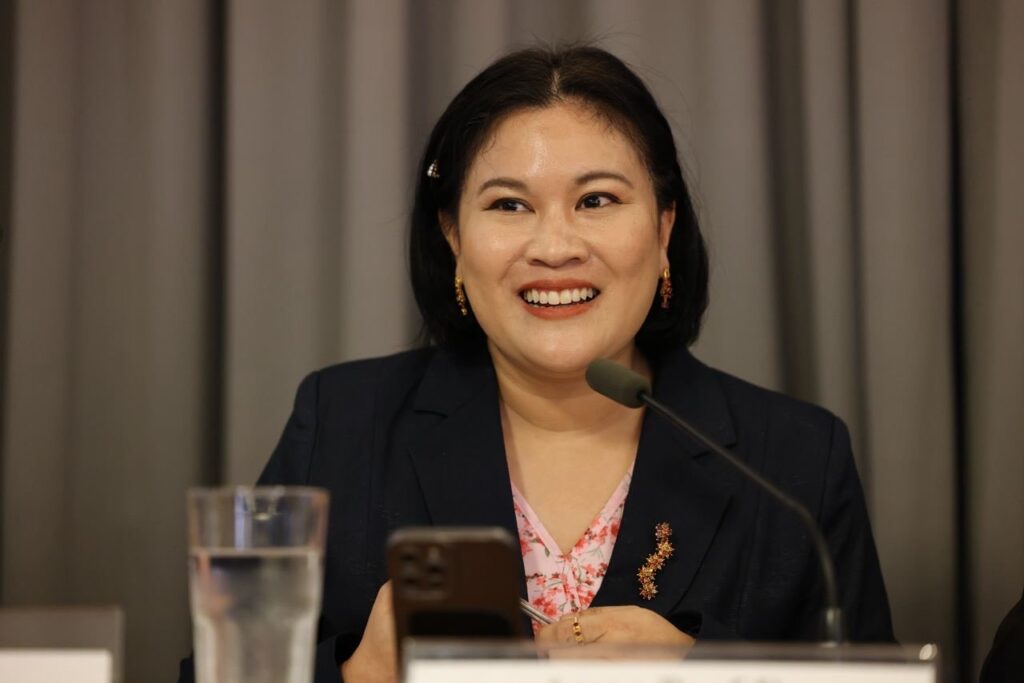
Assistant Professor Dr. Jaruprapa Rakpong, international trade law expert from the Faculty of Law, Thammasat University, said that Thailand is negotiating Free Trade Area (FTA) deals with the European Union (EU) to set out framework of cooperation. As far as I know, it covers the Illegal, unreported and unregulated (IUU) fishing which is an initial framework of the negotiation. Probably from early next year and onward, it will delve deeper into the detail of various topics. According to the EU regarding product and food safety standards exported from Thailand, Thailand has been able to solve the concerned problems quite successfully. EU is thus looing beyond these issues, and is placing its expectation on other standards. EU’s import of Thailand’s products accounts for less than 3% of its import from worldwide. As a major buyer, EU emphasizes the sustainable fishery standards and places its concern on IUU including on human rights and the environment through out the process in fishery industry. The European market shall be a key indicator. If we can comply with the European standards, it means we can export our products to anywhere in the world since other countries also adopt their standards on par with the European standards. Europe is a major market, albeit not the most valuable one. It is a quality market and our products exported to Europe can bring about high value-addedness. It can help to increase manufacturing process and employment in Thailand as well as our profitability.
Last but not least, Jaruprapa said that the government has to strike the balance on the issues. Otherwise, if we cannot adapt ourselves, we will be left behind others. The state must give a hand here. We need to compete with our quality and through the use of technologies. We must learn how to minimize our cost and how to move forward to ensure our sustainable growth. And we must learn to be the manufacturers of the products to generate more value-addedness. The labour issue is very important now. It should be encouraged to listen to viewpoints from migrant workers and to enhance their capacity building since they are indispensable for the industrial manufacturing in Thailand’s fishery. Without migrant workers, it’s like having lost the nuts and bolts since certain work requires menial labour which cannot be replaced by mechanics. Migrant workers are therefore a part of the supply chain and are our human resources which should be regularly developed.

